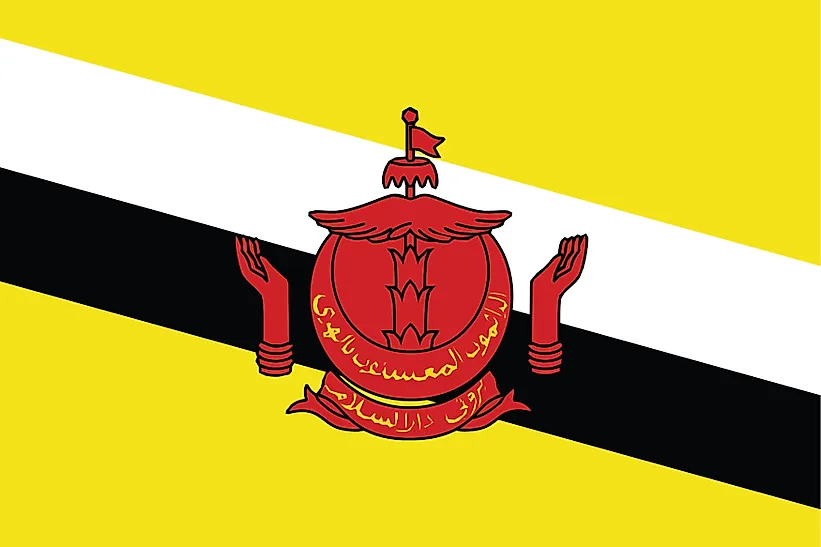
Brunei
| Continent | Asia |
| Capital | Bandar Seri Begawan |
| Population | 436,620 |
| GDP | $33.73 Billion |
| GDP per Capita | $79,700 |
| Dialing Code | +673 |
| ISO Code (2-letter) | BN |
| ISO Code (3-letter) | BRN |
About Brunei
Welcome to Brunei Darussalam, a small but prosperous sultanate on the island of Borneo. With a population of approximately 460,000 people occupying 5,765 square kilometers, Brunei combines Islamic traditions with modern development, powered by its significant oil and gas resources. Known officially as the Nation of Brunei, the Abode of Peace, this country offers visitors a glimpse into a unique blend of royal tradition, Islamic culture, and contemporary prosperity.
Geographic Features and Natural Beauty
Brunei’s geography features a coastal plain rising to hills in the east, with most of the country covered in pristine tropical rainforest. The country is divided into two parts, both located on the north coast of Borneo, separated by a small portion of Malaysia’s Sarawak state.
The Ulu Temburong National Park, known as the “Green Jewel of Brunei,” showcases the country’s commitment to environmental conservation. Accessible only by boat and elevated walkways, it offers visitors a chance to experience pristine rainforest from its famous canopy walkway.
The country’s coastline along the South China Sea features mangrove swamps and beautiful beaches, while its rivers, particularly the Brunei River, have historically served as important transportation routes and the foundation for water villages like Kampong Ayer.
Cultural Heritage and Traditions
Bruneian culture is deeply rooted in Islamic values and Malay traditions, with the Sultan serving as both head of state and religious leader. The country’s Islamic heritage is magnificently displayed in the Omar Ali Saifuddien Mosque and the Jame’ Asr Hassanil Bolkiah Mosque, both architectural masterpieces combining Islamic, Mughal, and Italian styles.
Traditional arts and crafts include kain tenunan (hand-woven fabric), silverwork, and brass casting. The water village of Kampong Ayer, known as the “Venice of the East,” has been continuously inhabited for over 1,300 years and maintains traditional lifestyle patterns while incorporating modern amenities.
Bruneian cuisine reflects Malay, Chinese, and Indian influences, with dishes like ambuyat (made from sago palm starch) and various curry preparations being popular. The country’s strict Islamic laws mean that alcohol is prohibited, but this has led to a vibrant culture of local non-alcoholic beverages and food establishments.
Historical Journey
Brunei’s history dates back to the 7th century, when it was known as Poni to Chinese and early Islamic writers. The Brunei Sultanate reached its golden age in the 15th and 16th centuries, when its control extended over coastal areas of Borneo and the southern Philippines.
The arrival of Western powers led to a gradual decline in Brunei’s influence, though it never fully lost its independence. The discovery of oil in 1929 marked the beginning of modern Brunei’s transformation. The country gained full independence from the United Kingdom in 1984, choosing not to join the Federation of Malaysia.
Modern Economic Landscape
Today’s Brunei enjoys one of the highest standards of living in Asia, thanks to its vast oil and gas resources. The country’s wealth has enabled it to provide its citizens with free education, healthcare, and heavily subsidized housing.
The government’s “Wawasan Brunei 2035” (Brunei Vision 2035) aims to diversify the economy beyond oil and gas, focusing on sectors such as finance, halal food, tourism, and technology. The country’s stable political environment and strategic location have made it an attractive destination for foreign investment.
International Relations and Global Position
Brunei maintains active participation in ASEAN and various international organizations. The country’s foreign policy emphasizes regional cooperation and Islamic solidarity while maintaining strong ties with traditional partners like the United Kingdom and Singapore.
Did You Know?
• Brunei’s citizens pay no income tax and enjoy heavily subsidized housing, education, and healthcare?
• The Sultan of Brunei’s palace, Istana Nurul Iman, is the world’s largest residential palace?
• Kampong Ayer, the world’s largest water village, houses over 30,000 people in houses built on stilts?
• The country has preserved over 70% of its original rainforest cover, one of the highest rates in the world?
Conclusion
Brunei represents a unique combination of traditional monarchy, Islamic values, and modern development. From its pristine rainforests to its golden-domed mosques, from its traditional water villages to its modern infrastructure, Brunei offers visitors a glimpse into a distinctive model of development. As it faces the challenges of economic diversification and environmental conservation, Brunei remains committed to preserving its cultural heritage while adapting to the demands of the modern world.





